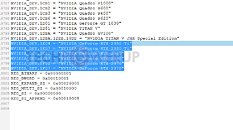Monday, September 17th 2018

NVIDIA Segregates Turing GPUs; Factory Overclocking Forbidden on the Cheaper Variant
While working on GPU-Z support for NVIDIA's RTX 20-series graphics cards, we noticed something curious. Each GPU model has not one, but two device IDs assigned to it. A device ID is a unique identification that tells Windows which specific device is installed, so it can select and load the relevant driver software. It also tells the driver, which commands to send to the chip, as they vary between generations. Last but not least, the device ID can be used to enable or lock certain features, for example in the professional space. Two device IDs per GPU is very unusual. For example, all GTX 1080 Ti cards, whether reference or custom design, are marked as 1B06. Titan Xp on the other hand, which uses the same physical GPU, is marked as 1B02. NVIDIA has always used just one ID per SKU, no matter if custom-design, reference or Founders Edition.
We reached out to industry sources and confirmed that for Turing, NVIDIA is creating two device IDs per GPU to correspond to two different ASIC codes per GPU model (for example, TU102-300 and TU102-300-A for the RTX 2080 Ti). The Turing -300 variant is designated to be used on cards targeting the MSRP price point, while the 300-A variant is for use on custom-design, overclocked cards. Both are the same physical chip, just separated by binning, and pricing, which means NVIDIA pretests all GPUs and sorts them by properties such as overclocking potential, power efficiency, etc.When a board partner uses a -300 Turing GPU variant, factory overclocking is forbidden. Only the more expensive -30-A variants are meant for this scenario. Both can be overclocked manually though, by the user, but it's likely that the overclocking potential on the lower bin won't be as high as on the higher rated chips. Separate device IDs could also prevent consumers from buying the cheapest card, with reference clocks, and flashing it with the BIOS from a faster factory-overclocked variant of that card (think buying an MSI Gaming card and flashing it with the BIOS of Gaming X).
All Founders Edition and custom designs that we could look at so far, use the same -300-A GPU variant, which means the device ID is not used to separate Founders Edition from custom design cards.
We reached out to industry sources and confirmed that for Turing, NVIDIA is creating two device IDs per GPU to correspond to two different ASIC codes per GPU model (for example, TU102-300 and TU102-300-A for the RTX 2080 Ti). The Turing -300 variant is designated to be used on cards targeting the MSRP price point, while the 300-A variant is for use on custom-design, overclocked cards. Both are the same physical chip, just separated by binning, and pricing, which means NVIDIA pretests all GPUs and sorts them by properties such as overclocking potential, power efficiency, etc.When a board partner uses a -300 Turing GPU variant, factory overclocking is forbidden. Only the more expensive -30-A variants are meant for this scenario. Both can be overclocked manually though, by the user, but it's likely that the overclocking potential on the lower bin won't be as high as on the higher rated chips. Separate device IDs could also prevent consumers from buying the cheapest card, with reference clocks, and flashing it with the BIOS from a faster factory-overclocked variant of that card (think buying an MSI Gaming card and flashing it with the BIOS of Gaming X).
All Founders Edition and custom designs that we could look at so far, use the same -300-A GPU variant, which means the device ID is not used to separate Founders Edition from custom design cards.

90 Comments on NVIDIA Segregates Turing GPUs; Factory Overclocking Forbidden on the Cheaper Variant
So....
In short, we are going to be needing software mods to get overclocking back?? Challenge accepted
(not by me of course, I wouldnt know where to start but there are lots of smart people on the internet)
Ahhh I get it now.
What sucks is the premium for the ones that can overclock. I'll be surprised if the cheap one is cheaper than the MSRP.
It's been done before to fake cards being something they aren't.
Gonna test it with my third-party MSI card and see what happens.
Don't you think a manufacture would find out by themselves if it can or cannot handle an overclock?
If Nvidia said "our lower-end cards wont be able to be overclocked, they will become unstable", that would be an entirely different story then "we FORBID YOU to sell overclocked cards of this variant".
The fact is, Nvidia did not have to launch anything. Pascal, despite the age, would continue being the best high-end cards on the market.
Why the hell would you pay 1200$ for a blower 2080ti (with potentially restricted overclocking) and not buy it straight from Nvidia for roughly the same money and with a very good cooler, power delivery and all that. See where this is going ? Of course right now they have nowhere near the required capacity to produce enough cards but they are sure taking measures to ensure that when the time comes they'll have a easy time. It all makes a lot of sense when you look into it, that's the next big step Nvidia wants to make.
And we customer are no longer able to get a cheap card and OC it for extra performance. Yay!
This is nvidia we are talking about here, if they can fleece people for more money, they will do it.
Nothing to see here folks, move along.
and...RTX 2080 Ti-K UNLOCKED, UNLEASHED, UNRESTRAINED !! version
nvidia eyes greener than ever !
My only problem is with how "serial" will the stuff that reviewers, who signed draconian NDA, will publish on 19th be.Erm, there were plenty of female nazis, the most famous director, for once, what is your signature about?